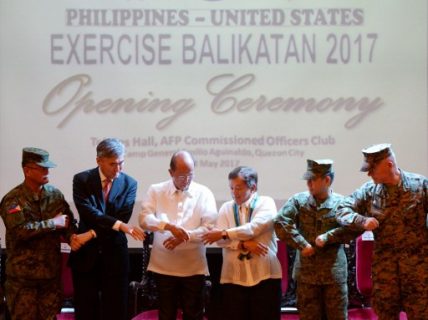
The Philippines and United States launched annual military exercises in Manila on May 8 but the longtime allies scaled them down in line with President Rodrigo Duterte’s pivot to China and Russia. / AFP PHOTO / TED ALJIBE
by Mynardo Macaraig
Agence France Presse
MANILA, Philippines (AFP) — The Philippines and the United States launched annual military exercises on Monday but the longtime allies scaled them down in line with President Rodrigo Duterte’s pivot to China and Russia.
Duterte in his 10 months in office has sought to weaken ties with the United States — the Philippines’ mutual defense treaty partner and former colonial ruler — saying its role as a global superpower is diminishing.
The 12-day “Balikatan” war games that began on Monday will involve fewer than half the number of soldiers than in 2015 during the term of Duterte’s pro-American predecessor Benigno Aquino.
There will also be no focus on strengthening the Philippines’ maritime defense capabilities.
In previous years this had been widely seen as a show of strength against Beijing over competing claims in the South China Sea.
Duterte has reversed Aquino’s policy of challenging China forcefully over the maritime territorial row, choosing instead to pursue closer economic, political and military relations with Beijing.
Officials from both sides spoke in glowing terms at the opening ceremony for Balikatan (meaning “Shoulder-to-shoulder”) about the upcoming exercise and their nations’ military relations.
But the American co-director for Balikatan, Lieutenant-General Lawrence Nicholson, said the US hoped the exercises would expand again.
“If you look back on 33 years of Balikatan, they are all different. There are any number of ways it can change. It can be bigger, it can be smaller. We hope it gets bigger,” Nicholson told reporters at Philippine military headquarters.
– In China’s ‘flow’
While on a trip to Beijing last year, Duterte, announced that he had moved into the “ideological flow” of China’s communist rulers.
He said in the lead-up to that trip that military exercises with the United States were a “humiliation” for the Philippines, and threatened to sever defense ties completely.
Other regular exercises have since been cancelled.
Much of Duterte’s criticism appeared to have been triggered by American criticism of his drug war, which has claimed thousands of lives and been condemned by rights groups as a possible crime against humanity.
Duterte responded to criticism from then-US president Barack Obama by repeatedly using personal slurs against him .
Ties have warmed under Obama’s successor Donald Trump, but Duterte has continued to signal his preference for building stronger relations with China and Russia.
He is due next week to visit China for a second time as leader, and is also expected to travel this month to Moscow for a meeting with Russian President Vladimir Putin.
But Duterte said last week he may be too busy to accept an invitation by Trump to visit Washington, even though no date had yet been proposed for the trip.
– Humanitarian focus
Previous editions of the Balikatan exercises involved large-scale joint operations in or near the South China Sea, which China claims almost in its entirety.
This year the exercises will focus only on counter-terrorism and disaster relief, the heads of the Philippine and US delegations said at the opening ceremony.
They will involve 2,600 American soldiers and 2,800 Filipino troops compared to a total of 12,000 in the 2015 edition of Balikatan.
One of the major exercises this year will simulate a response to a major storm hitting the eastern Philippines, then cutting across heavily populated areas including Manila.
The Philippines endures about 20 major storms a year that sweep in off the Pacific Ocean, many of them deadly.
Foreign policy analyst Richard Javad Heydarian said Duterte had acted pragmatically by downgrading military ties with the United States but not severing them as he had threatened.
“The president realises that the United States is the Philippines’ insurance policy if things go south with China. Eliminating that will take out the insurance policy,” Heydarian told AFP.
ajm-mm-kma/sm
© Agence France-Presse







